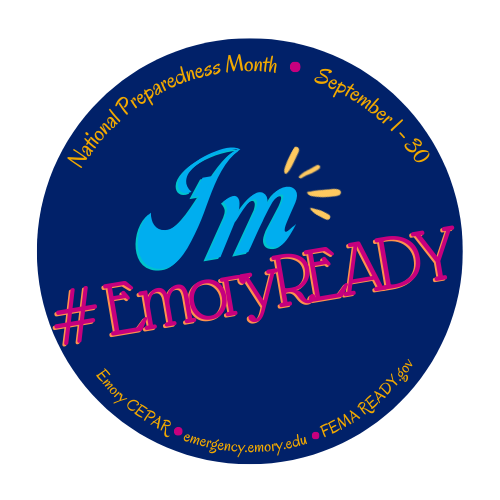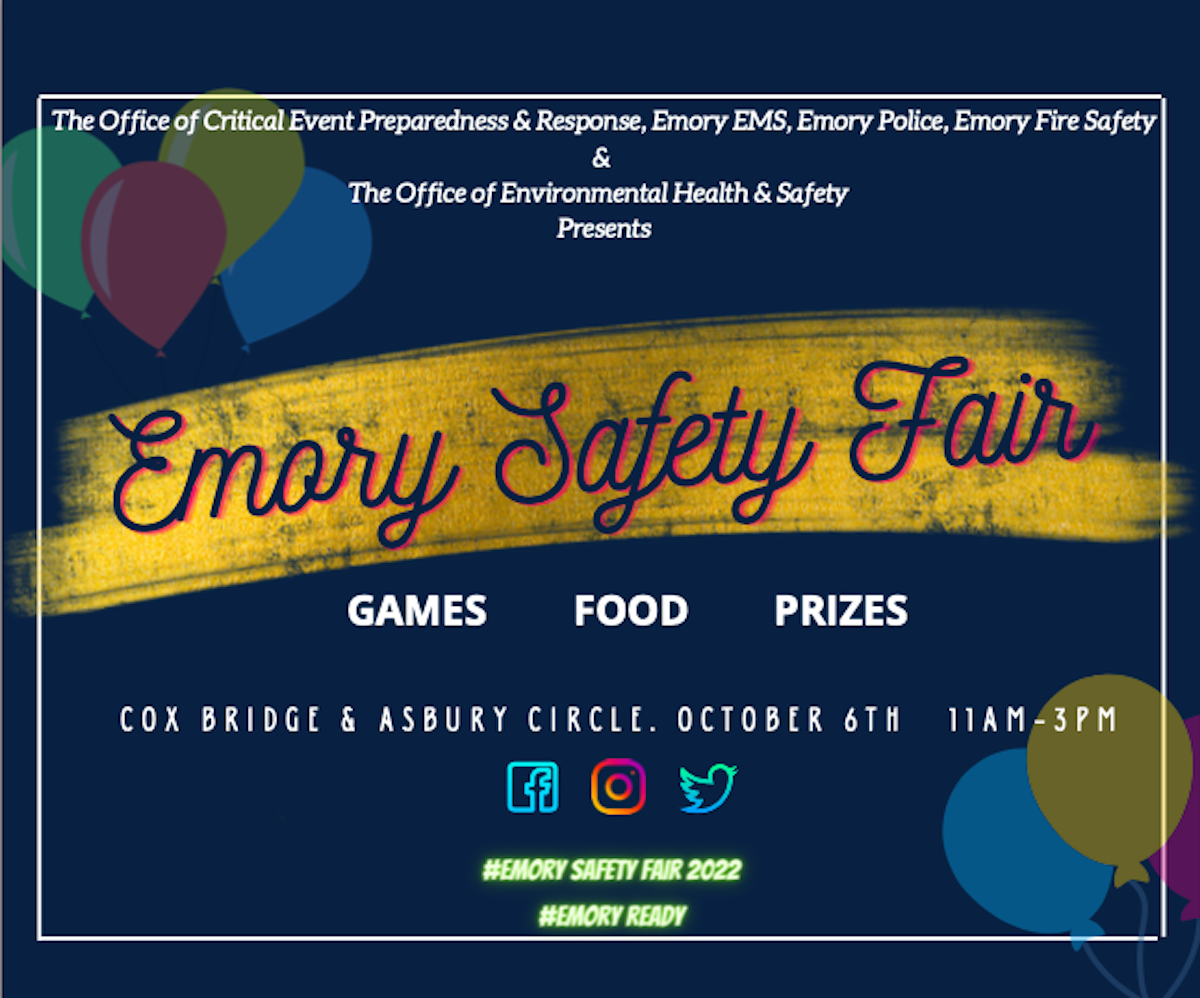Now that the fall semester has begun, investing the time to learn how to protect yourself and others when there is an emergency contributes to your personal safety, the community’s safety and Emory’s community resilience.
“Emergencies are unexpected, but when one occurs, knowing what to do — or simply where to look for help and resources — can be key to minimizing danger. The better prepared we are, the more resilient we are as a community,” says Sam Shartar, senior director of operations for Emory’s Office of Critical Event Preparedness and Response (CEPAR).
#EmoryREADY and National Preparedness Month

September is National Preparedness Month, scheduled each fall in partnership with the Federal Emergency Management Agency (FEMA) to help communities be ready to manage the risks of critical events and disasters. In recognition of the FEMA national “READY” campaign, the #EmoryREADY initiative focuses on promoting campus preparedness through education, training and outreach.
During September and early October, CEPAR is partnering with student organizations to raise awareness of personal/medical preparedness. Stop by our table during Wonderful Wednesdays this month and show your commitment to being prepared by picking up an “I’m #EmoryREADY” button, available only during the month of September. Additional events are forthcoming.
For more information on FEMA’s READY campaign, please visit ready.gov.
At Emory, emergency resources are in the palm of your hand with LiveSafe, a free mobile app. Developed for smartphones, LiveSafe provides a quick, convenient and discreet way for students, faculty and staff to communicate directly with Emory University public safety officials.
Key features of the app allow members of the campus community to:
- Call or message Emory University Police — or 911 — quickly.
- Quickly access a range of important campus safety resources, including information about emergency procedures and health and wellness contacts.
- Receive push notifications of campus safety and emergency alerts.
- Report safety concerns, accidents or crime tips in real-time to Emory Police via text, photos, video or audio.
- Navigate campus using a “SafeWalk” feature. The GPS-enabled location technology allows users to invite family, friends or colleagues to “virtually escort” them by following their location in real-time on a digital map. Alerts are sent when the user is delayed, has arrived or summons help.
CEPAR also developed the Emory University Preparedness Checklist, which provides directions for enrolling or updating emergency contact information in order to receive emergency alerts for severe weather, police emergencies or other critical events.
The checklists also offer:
- Basic safety information and reminders, such as a prompt to program phone numbers for Emory Police departments — and adding an “In Case of Emergency” (ICE) number — into your personal mobile phone.
- Suggestions for establishing a simple emergency communication plan so family and friends have an agreed-upon way to make contact during a campus or regional emergency.
- Prompts for knowing how to exit buildings if a primary pathway is blocked and where to seek shelter during severe weather.
- Handy contact information for campus emergency services, including health and counseling services and the Emory University Faculty Staff Assistance Program (FSAP).
“When emergencies occur, having the right information and understanding what you need to do is essential to making you better prepared and for keeping you safe,” Shartar says.
He suggests programming two “short codes” — 226787 and 678283 — into your list of cellphone contacts, along with unique ringtones, to quickly and easily identify an Emory emergency alert.
Emory EMS
Emory Emergency Medical Service (EEMS) is a volunteer, student-led EMS organization with oversight from CEPAR.
EEMS provides a medical first responder service for emergency medical care to Emory University students, faculty, staff, visitors and the surrounding community.
EEMS operates 24 hours per day, seven days per week, during the fall and spring semesters. The response area includes Emory University’s Clifton Campus and the immediate surrounding facilities, businesses and roads.
EEMS works in coordination with local EMS and fire departments responding to emergency and 911-based calls in the Emory community. In addition, it provides medical standby services for university events. The program also has a strong commitment to community outreach and education.
To request EMS services, call 911 or the Emory Police at 404-727-6111.
Think ahead and make plans now
For Emory faculty, staff and students, the new semester is a great time to become familiar with the university’s emergency resources. Reviewing the CEPAR website is a good start. Just as people test the batteries in their smoke detectors annually, taking time to review Emory’s emergency procedures in LiveSafe or the Just-In-Time guide should be considered a yearly ritual.
The CEPAR website provides wide-ranging resources and guidance for how to be prepared for a variety of emergencies, including power failures, water and gas leaks, medical emergencies, chemical spills or laboratory accidents, and severe weather and weather-related campus closures.
You will also find information about the CEPAR Office, Emory EMS, preparedness and training resources, community outreach and CEPAR programs.
Attend Emory’s annual safety fair on Oct. 6

This event will feature more than 30 safety, health and wellbeing organizations, resources and services available to the Emory community. There will be free giveaways, games and ice cream.
To stay updated, follow CEPAR on The Hub for event postings and on social media:
- Facebook: /EmoryCEPAR
- Twitter: @EMORY_CEPAR
- Instagram: @emorycepar
These simple steps will make you better prepared, more resilient, will contribute to your safety and may help save the lives of others in an emergency.Five ways you can be better prepared for an emergency

